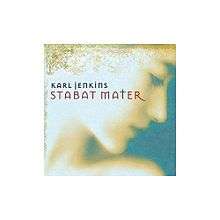Stabat Mater (Jenkins)
| Stabat Mater | ||||
|---|---|---|---|---|
 | ||||
| Studio album by Karl Jenkins | ||||
| Released | 10 March 2008 | |||
| Recorded | 2007 | |||
| Genre | Classical | |||
| Length | 62:02 | |||
| Label | EMI | |||
| Producer | Karl Jenkins | |||
| Karl Jenkins chronology | ||||
| ||||
Stabat Mater is a 2008 piece by the Welsh composer Karl Jenkins, and is based on the 13th-century Roman Catholic prayer Stabat Mater. Like much of Jenkins' earlier work, the piece incorporates both traditional Western music (orchestra and choir) with ethnic instruments and vocals - this time focusing on the Middle East. The recording features the Royal Liverpool Philharmonic Orchestra and Chorus, along with two soloists, Lithuanian mezzo-soprano Jurgita Adamonyte, and English musician Belinda Sykes, who both sings and performs on the duduk, an Armenian reed instrument.
Background to the piece
Written in the 13th century, the title Stabat Mater is actually an abbreviation of the first line, Stabat Mater dolorosa ('The sorrowful Mother was standing'). The poem reflects on the suffering of Mary, mother of Jesus, at the time of the Crucifixion. Jenkins' setting of the 20-verse poem is actually one of the longest of hundreds of extant settings of the work.
Jenkins' adaptation
Jenkins' work extends across twelve movements, six of which use texts other than the original poem. They include a choral arrangement of the "Ave verum" Jenkins originally wrote for Bryn Terfel; a movement entitled "And The Mother Did Weep" which comprises a single line sung simultaneously in English, Latin, Greek, Aramaic, and Hebrew; "Lament," written by Jenkins' wife Carol Barratt; and "Incantation," which is partly sung in early Arabic by Belinda Sykes.
Stabat Mater focuses on the suffering of Mary, but unlike earlier adaptations of the text, Jenkins incorporates the language of the period, with lines sung in Aramaic and early Arabic. The addition of Armenian instrument the duduk (or ney) heightens the Eastern atmosphere, and its deep double-reeded sound adds a richer, more resonant dimension to the work than can perhaps be achieved using Orchestra alone. Alongside the duduk, Jenkins features percussion from the Middle East, such as the darabuca, def, doholla, and riq.
Although it was not mentioned in the CD notes or concert programme, the first movement is actually an extended variation of a piece from his Adiemus, Cantus-Song of Tears, using the same format (with soft introduction preceding the main melody) and harmonisation. Also, the seventh movement, "And The Mother Did Weep", is an adaptation of the seventh movement of the first Adiemus-album which was called "Amaté Adea".
Première and recording
The piece received its world premiere in Liverpool Anglican Cathedral on Saturday 15 March 2008 and featured the Royal Liverpool Philharmonic Chorus and Orchestra, Jurgita Adamonyté, Belinda Sykes, and was conducted by Jenkins himself. The piece was recorded with the same personnel and the EMO Choir of Helsinki, and was released by EMI on Monday 10 March 2008.
Movements
Jenkins' Stabat Mater is divided into 12 movements. Unlike his Requiem, no movements combine both liturgical and non-liturgical texts.
| Movement | Texts/Language(s) |
|---|---|
| 1. Cantus lacrimosus (full chorus, chamber chorus) | Verses 1-4 of the Stabat Mater |
| 2. Incantation (vocalist) | Traditional texts (Arabic) |
| 3. Vidit Jesum in tormentis (chamber chorus) | Verses 5-10 of the Stabat Mater |
| 4. Lament (mezzo-soprano) | A poem by Carol Barratt (English) |
| 5. Sancta Mater (full chorus, chamber chorus) | Verses 11-14 of the Stabat Mater |
| 6. Now my life is only weeping (mezzo-soprano, vocalist, chamber chorus) | A poem by Rumi (English, Aramaic) |
| 7. And the Mother did weep (chamber chorus) | A line by Karl Jenkins (English, Hebrew, Latin, Aramaic, Greek) |
| 8. Virgo Virginum (chamber chorus) | Verse 15 of the Stabat Mater |
| 9. Are you lost out in darkness? (mezzo-soprano, vocalist, chamber chorus) | The Epic of Gilgamesh (English, Aramaic) |
| 10. Ave verum (chamber chorus) | Ave Verum Corpus (Latin) |
| 11. Fac, ut portem Christi mortem (chamber chorus) | Verses 16-17 of the Stabat Mater |
| 12. Paradisi Gloria (full chorus, chamber chorus) | Verses 18-20 of the Stabat Mater |